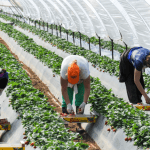Tackling The UK’s Food Processing & Production Skills Shortages – March 2019 Update
Food and drink manufacturing contributes around £30bn to the UK economy and employs almost 400,000 workers. With UK unemployment at a record low of 3.9% this week, the lowest since 1975, skills shortages still continue to present a cause for concern for the food processing & production sector and the food & drink manufacturing industry as a whole.
In 2018 54% of food and drink manufacturers said they were having difficulty recruiting the skilled people their business needs. This figure has decreased slightly, from 57% in 2017 and 70% in 2016. The most sought-after employees labourers and unskilled manual workers, production-related technical skills, sales & marketing. Only
5% reported software and IT skills shortages.
The likely impact of Brexit is also an added challenge for the industry which currently employs more than 125,000 EU citizens, a third of all workers and generates £22bn of exports.
According to the UK Commission for Employment and Skills, food and drink manufacturing will need 140,000 recruits by 2024 as older workers retire and other trades and sectors attract younger workers.
 Food & drink is Scotland’s largest manufacturing sector, accounting for 30% of total manufacturing turnover and employing around 45,000 people, 25% of the Scottish manufacturing workforce. The sector has 1015 food and drink manufacturing businesses, 95% of which are SMEs.
Food & drink is Scotland’s largest manufacturing sector, accounting for 30% of total manufacturing turnover and employing around 45,000 people, 25% of the Scottish manufacturing workforce. The sector has 1015 food and drink manufacturing businesses, 95% of which are SMEs.
By 2024 Scotland food and drink manufacturers will need 19,000 new recruits by 2024 to meet their skills requirements. Skilled and experience engineers and food scientists, in particular, are needed to ensure continued growth and innovation.
Food Processing & Production Apprenticeships Update – UK
Apprenticeships are a way for food processing & production companies to beat the competition and lure talent by offering the highest-quality training available, not only for junior level workers, but offer fast-track opportunities to those with management potential.
In March 2019 the National Skills Academy for Food and Drink released a ‘State of the Nation’ report, looking at the health of the UK’s food and drink workforce and the impact of the Apprenticeship Levy on the food and supply chain. The report surveyed trade organisations and organisations from across the food and drink supply chain, s such as National Farmers’ Union, Food and Drink Federation, British Hospitality Association, Lantra and Landex.
The report found that SMEs are being left behind and unable to implement apprenticeships due to the fact that they are not compelled to pay the Apprenticeship Levy and therefore cannot financially take on apprentices as readily as larger organisations;
Justine Fosh, who prepared the report,said: “Overall, the new system has been broadly welcomed by the food and drink sector, however across the board the consensus is that non-levy paying companies are missing out on the opportunities. “Government reforms have sought to put control of the system – including the means to pay for apprenticeships – in the hands of employers, however this is not the case for SMEs. SMEs do not pay the levy and so don’t have their ‘own’ funding pots, they are reliant on providers who have been successful in gaining special contracts to work with them. Not all of these providers have the specialist capability to deliver an apprenticeship to food businesses and so this mismatch can result in SMEs being unable to access the new standards.”
In response to the report, the National Skills Academy for Food & Drink on behalf of the Skills Working Group are now convening a specialist group to look at how provision can better serve the needs of the SMEs and the wider food and drink industry and the 95% of Scottish food & drink manufacturing business which are SMEs.
Food Processing & Production Apprenticeships Update – Scotland
In Scotland the bakery sector for example has found that more than 50% of the bakery trade is experiencing difficulties in recruitment – lack of skills, experience and poor attitudes to work are proving to be the major issues. Apprenticeships are one way the sector is looking to plug their skills gaps.
Food and Drink Federation Scotland and other partners in the Scotland Food & Drink Skills Partnership Group are working together to address the skills gaps and shortages, through an industry skills programme ‘A Future in Food’, including the Foundation Apprenticeship in Food and Drink Technologies which is targeted at senior school pupils.
However, there is still some way to go for Scottish food & drink manufacturing to make the most of apprenticeships. At the end of Q3 2018/2019 food & drink modern apprenticeships accounted for only 5% of all apprenticeships, 1008 out of a total 19,985, with construction accounting for 25%.
New Centre Of Excellence For Agriculture & Food Processing East Sussex
East Sussex has been allocated £5.4m of Local Growth Fund cash for three projects which could create more than 1,000 new jobs, apprenticeships and college places. £2.9m of the funding will go towards creating a new £7m centre of excellence at Plumpton College for the agrifoods sector – including new training suites for meat processing and bakery. The scheme is aimed at boosting productivity in the sector during the Brexit transition and in the 10 years following, and will support 204 new apprenticeship posts and 248 additional learners.
New Food & Drink Packaging Degree Apprenticeship Programme – Sheffield
In February 2019 the National Skills Academy for Food & Drink (NSAFD) launched a new packaging degree apprenticeship in conjunction with Nestle, Premier Foods and Smurfit Kappa to help address the current skills shortage in the UK packaging industry, including the food and drink sector. The new apprenticeship will be delivered by Sheffield Hallam University which hosts the University’s National Centre of Excellence for Food Engineering. Sheffield Hallam is also the approved provider of the Advanced Food and Drink Engineer Degree Apprenticeship which is now recruiting its first students to start in September 201
Food Processing & Production Industry Work Experience Programme – Secondary Schools – Manchester
National education charity Future First has partnered with The Flava People, which supplies the UKs leading retailers, restaurants and food manufacturers with sauces and seasonings, to set up a scheme informing secondary school students about the skills necessary to succeed in the food and hospitality industry.
Under the scheme, The Flava People will welcome Year 11 students from two Manchester state schools to its Sharston factory to see the production line first hand, benefit from the experience of staff and learn the skills they need to be successful in work. The insight days will help students understand the wide range of careers available in the food industry and the study routes students should choose to pursue specific roles.
Matt Lent, Chief Executive Officer Future First, said, “Students cannot be what they can’t see. Future First’s new partnership with The Flava People will provide inspiring opportunities for more young people to develop their employability skills and understand the food industry. Students will be able to connect with experienced staff whose stories will bring the industry alive. Hearing from employees in interesting jobs helps students make better informed decisions about what they need for their working life as well as develop the skills employers are looking for.”

Looking for top food processing & processing staff?
Call Ten Live Recruitment – quality staff, quick turnaround, excellent service
Rated 5***** by our customers on Google
Contact:
 Joanne Telfer
Joanne Telfer
Director
Ten Live Group
![]()
Award-Winning Food & Drink Manufacturing Recruitment Experts
Mob: ++44(0) 7547 761779
Email joanne@tenlivegroup.com
Skype: joanne.telfer4
Tel: ++44 (0) 1236 702007
SOURCES












